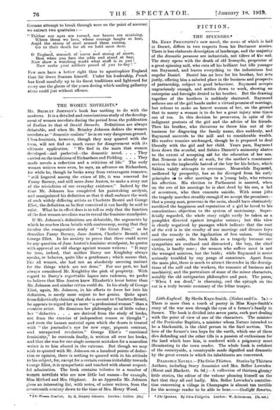FICTION.
THE SPINNERS.•
MR. E rum Parrcrorrs's now novel, the scene of which is laid in Dorset, differs in two respects from his Dartmoor stories. There is less elaborate description of landscape, and the majority of the dramatis personae are industrials, not tillers of the soil. The story opens with the death of old Ironsyde, proprietor of a great spinning mill, who cuts off his brilliant but idle younger son Raymond, and leaves everything to the industrious but angular Daniel. Daniel has.no love for his brother, but acts justly, offering him a salaried place in the business and prospects of partnership, subject to good behaviour. Raymond accepts ungraciously enough, and settles down to work, showing an enterprise and foresight denied to his brother. But the drawing together of the brothers is suddenly shattered. Raymond seduces one of the girl hands under a virtual promise of marriage, but refuses to make an honest woman of her, on the ground that to marry a woman is to do her a great injury nine times out of ten. In this decision he perseveres, in spite of the indignant protests of the girl and the advice of his friends. Then his brother, who threatens to throw him out of the business for disgracing the family name, dies suddenly, and Raymond succeeds to the mill and to considerable wealth. His resolve remains unchanged, though he is prepared to deal liberally with the girl and her child. Years pass, Raymond lives down the scandal, and Sabina Dinnett's animosity abates to the extent of accepting aid for the education of her son. But Nemesis is already at work, for the mother's resentment revives in the implacable hatred of the boy for his father, which Sabina vainly attempts to overcome. Meanwhile Raymond, mellowed by prosperity, has so far diverged from his early principles as to offer marriage to a 'young lady, who returns his affection. His election to Parliament is [assured, when on the eve of his marriage he is shot dead by his son, a lad of seventeen, who then commits suicide. With some jolts the tragedy marches steadilyenough if we accept the presnisees — that a young man, generous in the main, should have obstinately sacrificed the happiness and reputation of a girl he loved to his conscientious objection to the system of matrimony. Super- ficially regarded, the whole story might easily be taken as a pamphlet directed against irregular unions ; but this view is clearly negatived by passages which indicate that the root of the evil is in the cruelty of our marriage and divorce laws and the remedy in the legalization of free unions. Setting controversy aside, the book fails as a tragedy because our sympathies are confused and distracted ; the boy, the chief victim, is hardly sane ; the woman who suffers moat is not the wronged mistress, but the bride; while Raymond is never seriously troubled by any pangs of conscience. Apart from the main plot, there is much to attract the reader in tIM descrip- tions of the mill and the workers, the romance of business and machinery, and the portraiture of Some of the minor characters, notably the old antiquarian philosopher and poet. The poem, " When I am dead," is charming, and the epitaph on the cat is a truly laconic summary of the feline temper.


































 Previous page
Previous page